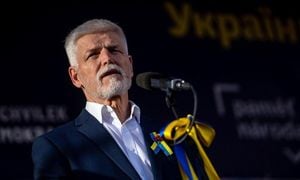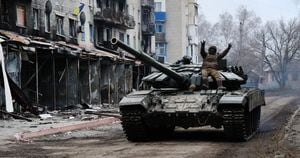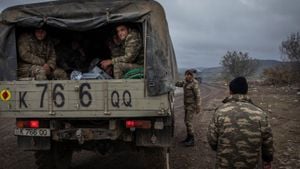Tensions continue to rise dramatically across Georgia as thousands of citizens pour onto the streets of Tbilisi, launching fireworks and clashing with riot police over the government’s controversial decision to suspend negotiations to join the European Union. What began as peaceful protests have swiftly turned hostile since Prime Minister Irakli Kobakhidze announced last week the country's pivot away from its European integration ambitions, igniting widespread outcry and accusations of political repression.
From the outset, the protests have been fueled by widespread discontent against the ruling Georgian Dream party, traditionally seen as pro-Western, but whose recent actions have raised alarms about its erosion of democratic principles. Following the October parliamentary elections, which the opposition claims were marred by fraud and suppression, Georgian Dream's unexpected announcement to freeze EU accession talks for four years has acted like gasoline on the flames.
On December 1, during the protests, demonstrators confronted riot police who engaged them not only with tear gas but also water cannons. Videos surfaced showing protesters setting off fireworks and challenging police lines, which only added to the chaos of the moment. Some 224 folks have been arrested since the start of the protests, with many facing injuries from the skirmishes.
“We want our European destiny to be returned to us,” said President Salome Zourabichvili, echoing the sentiments of the demonstrators as she called out to European nations to support their plight. Amid the violence, reports of police brutality have emerged. The Georgian Young Lawyers' Association revealed horrifying stories of detainees suffering beatings and severe mistreatment, with some claiming they were forced to wear bloodied socks to stop bleeding from injuries inflicted during their arrest.
The situation is particularly tense as Prime Minister Kobakhidze has shown no signs of yielding to the opposition’s demands for dialogue. His resolution is troubling; he accused foreign entities of attempting to meddle with Georgia’s internal affairs and referred to the EU’s criticisms as merely “blackmail and manipulation.” With alliances between the government and influential figures like billionaire Bidzina Ivanishvili coming under scrutiny, the prospect of renewed talks with the EU seems increasingly unlikely.
Kobakhidze has establish ed himself as the face of this stance, asserting the decision to halt negotiations until 2028 is to prepare the country economically for eventual EU membership. Yet, the majority of Georgians favor EU membership, viewing it as intrinsic to their national identity, distinct from Russia's orbit.
“There are no signs of easing tensions,” stated local political analyst Alexandre Crevaux-Asatiani. He expanded on this view, adding, “It seems the government has miscalculated the public sentiment; now they've awakened something larger than they anticipated.” The opposition, emboldened by public backing, vows to maintain momentum.
Further complicate matters are remarks from the Kremlin. Dmitry Peskov, spokesperson for the Russian government, has been quick to dismiss claims of interference, describing protests as solely Georgia's internal affair. This echoes sentiments among Georgians who fear their government is heading toward authoritarianism, repeating patterns seen previously with political movements across Eastern Europe.
Simultaneously, there are international implications to Georgia’s domestic unrest. The U.S. and European Union have expressed concern over the situation, stressing the need for adherence to democratic principles and the protection of human rights. U.S. senator Jim Risch has publicly sided with the protesters, emphasizing accountability for violent actions during the demonstrations.
Adding to the complexity are calls from various opposition parties for Zourabichvili to resist stepping down from her role until new elections can be confirmed, which they argue are necessary to legitimize the current political climate. Officials within the opposition, such as Coalition for Change leader Zurab Japaridze, face repeated harassment from authorities, as police have intensified their crackdown on demonstrators.
Many Georgians view these protests as more than just opposition to the government. They represent the nation’s struggle for its identity amid powerful geopolitical forces, grappling with the legacy of Soviet rule and aspirations for European alignment. A key slogan echoed through the streets states plainly: “No to Russia, Yes to Europe.”
The conflict has reverberated through Georgia, with protests reported not just in Tbilisi, but also across other cities like Batumi and Kutaisi, each rally echoing calls for freedom, democracy, and EU membership.
Reports from various rights organizations document health impacts among protesters, with many treated for injuries sustained during clashes. The stark images of the injured and detained resonate deeply among the populace, heightening existing frustrations with both local and global political structures.
The question looms large as the days of unrest continue: How long will the populace endure this uneasy balance of power? What is certain, though, is the growing determination of Georgians to be heard as their national identity and future hangs precariously within the balance of their government’s next moves.
The violent crackdown and the call for renewed EU aspirations underline the urgent situation at hand. The world watches as Georgia stands at this geopolitical crossroads, its citizens rallying for their vision of the future against seeming indifference from those who hold the reins of power.
For now, it’s clear – the fight for democracy, sovereignty, and alignment with European aspirations continues unabounded, echoing through the streets of Tbilisi as citizens brave the odds on the frontlines, united for change.



